By: Elizabeth Obigwe, B.Sc. Anatomy. Freelance Writer. Medical review by The DLHA Editorial Team.
A middle-aged black man looking distressed and holding his head in his hands suggesting he has a severe headache
When we get a headache, we try to take care of it by resting, hydrating or using over-the-counter medications. These measures often help to take care of most primary headaches. But sometimes, there may be more to a headache than the pain you feel. It could be a sign that something more serious is going on within your body.
So, how do you know which headache is serious and which isn’t? It can be hard to tell sometimes, but the headache signs discussed below can help you know when you need immediate medical attention.
1. You Report First Worrisome Headache After Age 50

First report of headache at 50 years and above is serious. Image credit: Freepik
If an adult over 50 years complains about a new or persistent headache, it's best to treat it with urgency because elderly people are at higher risk of dangerous secondary headaches. Secondary headaches occur as a result of underlying health conditions that may result in complications if not treated. Some of the concerning secondary causes of headache in elderly people include; cancer, intracranial hemorrhage (bleeding inside the skull), and occult trauma (an injury that isn't immediately obvious or considered worthy of report).

A sudden and severe headache is serious.
This type of headache may be caused by an aneurysm, an expansion or “ballooning” of a blood vessel in the brain. An aneurysm typically has no symptoms and you may only get to find out that you have one when it ruptures. This rupturing can cause a sudden and severe headache which becomes even worse within seconds. It is also called a thunderclap headache or may be described as “the worst headache of your life.” Aside from the pain, a ruptured aneurysm causes bleeding around the brain, a condition called “subarachnoid haemorrhage”. A ruptured brain aneurysm can be fatal.
.jpg)
A young black lady looking distressed and holding her possibly stiff and painful neck
You have probably experienced stiffness of the neck caused by a bad sleeping position or overusing the neck. It makes your neck feel sore or painful and difficult to move. Usually, this is temporary and can go away without any treatment. However, a stiff neck accompanied by a headache may also be a symptom of a more serious condition called meningitis.
Meningitis is an inflammation of the membranes surrounding the brain and spinal cord. It can be caused by viruses or bacteria and sometimes fungi. Additional symptoms include fever and nausea. This is a serious condition that requires immediate medical attention.
Serious headache may be associated with stroke.
The appearance of neurological symptoms alongside a headache is one of the most dangerous headache signs. It may be a sign of a stroke. So, don't take any chances. Seek emergency medical care immediately. Some of the symptoms to look out for include balance problem and or and sudden trouble walking, blurry eyesight, facial droop, weakness of arm and leg, difficulty speaking and confusion.

Headache with worsening pattern over time is serious.
When a worsening pattern is associated with primary headaches like migraine and tension-type headaches, it may be a result of medication overuse, a condition called rebound headache. This headache happens when you take medicines for headache pain too frequently, they start to cause more chronic pain.
However, in some cases, worsening patterns of headache may be due to more advanced problems like abnormal tissue growth (mass lesion) or accumulation of blood on the brain's surface (subdural hematoma). Seeking medical evaluation can help you know whether or not the worsening pattern is a serious headache symptom.
.jpg)
A serious headache may occur after head injury.
A head injury is any harm or trauma to your brain, skull, or scalp and can range from minor to severe. The headache you may experience after a head injury is known as a post-traumatic headache. Post-traumatic headaches are more common in minor to moderate injuries like concussions. However, more severe injuries resulting in skull fracture, accumulation of blood close to the brain or under the scalp, and bruising of the brain can also cause headaches. Therefore, it is best to seek medical care after head injuries especially if you experience a headache. This will help ensure that no severe injury goes unnoticed.
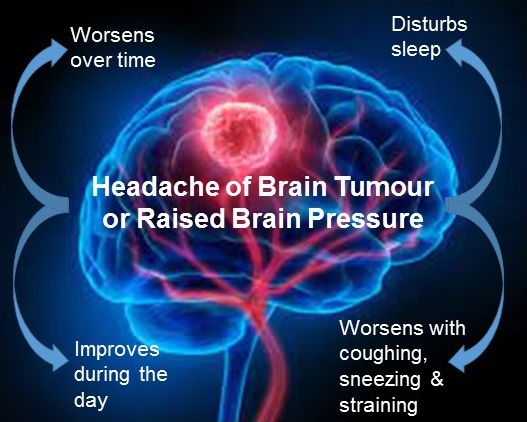
Headache worsened by coughing, sneezing and straining is serious.
A headache that worsens with coughing, sneezing and straining may be a result of increased pressure inside the skull, known as intracranial pressure. Several factors can lead to increased intracranial pressure. However, a common secondary cause is brain mass or tumour. This type of headache is different from exertion headache which may also be triggered by coughing or other strenuous activities. While exertion headaches come and go within minutes to hours of performing the activity, this secondary headache is usually persistent and worsens with activity.
.jpg)
Headache that disturbs sleep and improves during the day is serious.
Headaches that disturb sleep may be a result of primary conditions like hypnic headaches, migraines and cluster attacks. However, secondary conditions like mass lesions may also result in headaches that disturb your sleep. Headaches associated with mass lesions usually worsen when you lie down or assume a reclining position but feel better when you sit or stand. This may explain why the headache disturbs you when you sleep.

A new chronic headache developing in a cancer patient is serious.
Chronic headaches in cancer patients without any response to treatment may be caused by a tumour or as a result of their therapy. Cancers have the ability to break away from their primary sites and travel to another part of the body to form a new tumour. This process is called metastasis. Cancers in the lung, skin, kidney and breast are most likely to metastasise to the brain. In addition to the headache pain, patients may also show neurological dysfunctions such as seizures, weakness and loss of muscle control numbness, etc.
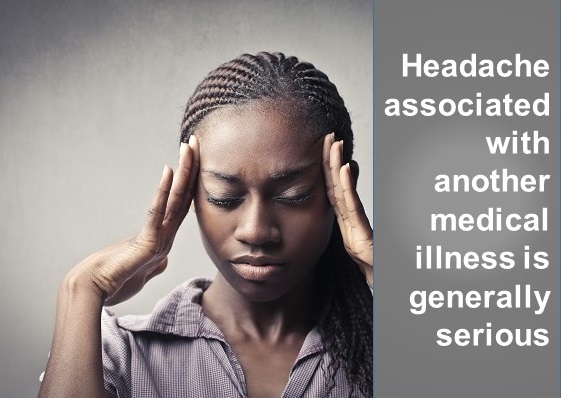
Headache occurring with another medical illness is serious.
Except you have been diagnosed, you may not know that you have a systemic condition that is causing you to have a headache. However, if you have headaches accompanied by fever, rash, fatigue, decreased concentration, etc. these may be indications of other underlying medical conditions. Similarly, headaches accompanied by a systolic blood pressure ≥ 180 mm Hg and/or diastolic pressure ≥ 120 mm Hg might be linked with severe hypertension. Generally, headaches occurring with other underlying medical conditions will be accompanied by different symptoms depending on the underlying cause. Therefore you will need proper medical examination to determine the possible causes.
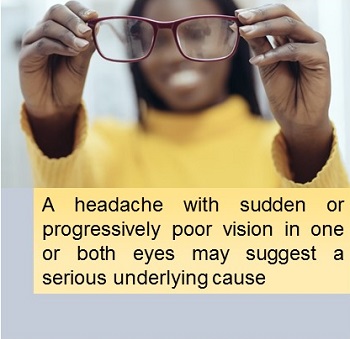
Headache associated with worsening poor vision is serious.
Primary headaches like migraine may be associated with visual symptoms, typically involving colours, bright or unusual light patterns or partial loss of vision. The visual symptoms of migraine usually precede the headache, develop gradually over a period of 5 to 20 minutes and resolve within 60 minutes. However, when headache is accompanied by sudden or progressively worsening visual impairment, it may be a sign of a more serious underlying condition.
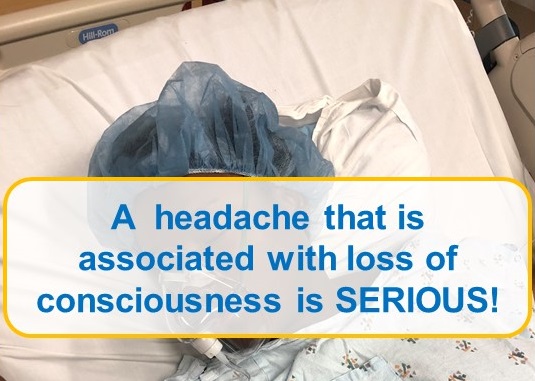
Headache associated with loss of consciousness is serious.
Headache accompanied by loss of consciousness is one of the most dangerous headache signs and requires immediate medical attention. Your doctor will diagnose the underlying cause based on whether you fainted or had a seizure. Both scenarios indicate different possible causes.
Final Words
When you develop a headache that is sudden, worse than usual, shows an unusual pattern or is accompanied by other symptoms, it may be an indication that there is an underlying serious cause and self-care or self-medication would not be appropriate. If you have any of the headache conditions described, it is better to seek prompt and proper medical attention to identify and or exclude the possibility of other diseases or prevent further complications.
Also, headaches in certain groups of people like adults above the age of 50, pregnant women and people with weak immune systems should not be overlooked.
Resources
Tabatabai RR & Swadron SP. Headache in the emergency department. Emergency Medicine Clinics of North America. 2016;34(4):695–716. doi:10.1016/j.emc.2016.06.003. Abstract. Available from here.
Hainer BL & Matheson EM. Approach to acute headache in adults. Am Fam Physician. 2013;87(10):682-687. Available from here.
Ward TN, Levin M & Phillips JM. Evaluation and management of headache in the emergency department. Medical Clinics of North America. 2001;85(4):971–985. doi:10.1016/s0025-7125(05)70354-0. Abstract. Available from here.
Related:
What Africans Need to Know About Tension Headache
Migraine: An Overview for Africans
Headache: An Overview for Africans
Published: September 1, 2024
© 2024. Datelinehealth Africa Inc. All rights reserved.
Permission is given to copy, use and share content without alteration or modification and subject to attribution as to source.
DATELINEHEALTH AFRICA INC., is a digital publisher for informational and educational purposes and does not offer personal medical care and advice. If you have a medical problem needing routine or emergency attention, call your doctor or local emergency services immediately, or visit the nearest emergency room or the nearest hospital. You should consult your professional healthcare provider before starting any nutrition, diet, exercise, fitness, medical or wellness program mentioned or referenced in the DatelinehealthAfrica website. Click here for more disclaimer notice.